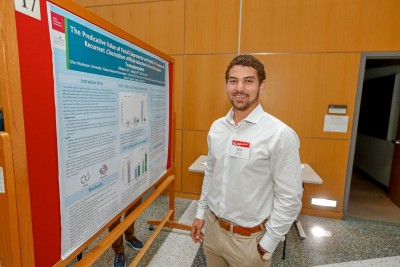Abstract
Predicative Value of Fecal Indole and Calprotectin in Successful Outcome in Fecal Microbiota Transplantation (FMT) for Clostridium difficile Infection (CDI)
 Student: Jack Hibbard
Student: Jack Hibbard
Faculty Mentory: Herbert DuPont (McGovern Medical School Department of Internal Medicine)
Clostridium difficile infection (CDI), which is caused by an overgrowth of Clostridium difficile bacteria in the gut, is the leading cause of death from diarrhea in the United States. It has been recently treated effectively by fecal microbiota transplantation (FMT), a process in which fecal material from a healthy donor is carefully prepared and transferred to the recipient’s colon. The goal of this study was to identify if stool levels of two organic compounds abundant in the gut, known as calprotectin and indole, could be used to predict whether or not a CDI patient would respond well to FMT. High levels of calprotectin in patients were seen in treatment failures, while high levels of indole were associated with successful treatment and recovery.
Clostridium difficile infection (CDI) is the leading cause of death from diarrhea in the United States and has recently been shown to be effectively treated by fecal microbiota transplantation (FMT), a process which involves the transfer of fecal material from healthy donor to patient in an attempt to diversify the patient’s microbiome and prevent recurring Clostridium difficile overpopulation. This study aimed to evaluate the predicative value of two prospective biomarkers, calprotectin and indole, in a patient’s potential response to FMT. Elevated levels of calprotectin have been associated with high levels of inflammation brought on by cases such as inflammatory bowel disease and CDI and has been shown to decrease with FMT, while indole has been related to producing positive beneficial effects on the gut through various mechanisms. This study analyzed stool samples from several subjects both before and seven days after undergoing FMT. Fecal indole levels were measured by a colorimetric assay using published methods, and fecal calprotectin by ELISA. Results showed that under certain conditions, increased fecal calprotectin levels correlated with poor response while increased fecal indole levels were associated with successful outcome and lack of recurrence in patients with CDI after undergoing FMT.
